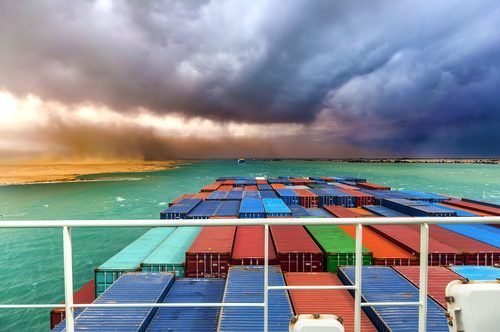August 25, 2016 | Industry Insights
Navigating the Storm: Planning for Disasters, Protecting Cargo

The National Oceanic and Atmospheric Administration (NOAA) recently updated its 2016 Atlantic Hurricane Season Outlook, calling for a higher likelihood of a near-normal or above-normal season. In fact, the season, which runs from June through the end of November, is expected to be the most active since 2012. According to NOAA forecasters, we should expect a 70% chance of 12 to 17 named storms, of which 5 to 8 are expected to become hurricanes, including 2 to 4 major hurricanes. The seasonal averages are 12 named storms, 6 hurricanes and 3 major hurricanes.
Is your logistics firm prepared for a disaster should it occur? What type of plan do you have in place and how robust is it to protect your employees, property, and cargo? All we have to do is look back a few years to be reminded of the impact a hurricane can have on our operation and the supply chain. When Super Storm Sandy hit the East Coast, seaports stretching from Baltimore to Boston were closed to containerized traffic indefinitely. The Port of New York/New Jersey – the largest East Coast ocean cargo gateway – was shut down in anticipation of the storm. Moreover, millions of dollars of cargo was lost.
Being Prepared
There are a number of measures logistics firms can take before a hurricane hits to prevent the loss of property and life. This includes having an evacuation plan in place to take care of your employees (safety first), securing loose property, backing up data and reviewing your insurance coverage to make sure that your policies are up to date and will respond in the event of a loss. For example, do you have commercial Flood insurance in place?
Additionally, for logistics service providers, including freight forwarders and custom house brokers, it’s important to not only take measures to protect your own property but also that of your clients’ cargo in a warehouse, at the docks or in transit. Even the most experienced shipper may need to be reminded of the potential risks to their supply chain, and will benefit from the help of their transportation professional to assist in identifying and mitigating these risks. This provides you with an opportunity to hone in and earn a client’s long-term trust.
Make certain that Cargo insurance has been offered to all clients and that they understand its necessity. Shippers should be clear that if damage occurs to their cargo during a storm while in a third-party warehouse, the loss will not be covered. This could cost your client thousands of dollars or more in losses that could have been avoided. Standard terms & conditions, warehouse receipts, and bills of lading exclude acts of God from liability as supported by civil law. There’s no better time than the now to reiterate your terms and conditions with our clients, as well as those of your carriers.
In addition to protecting the financial interest in cargo stored in a warehouse, shippers must also consider the risk that exists for goods on the dock awaiting shipment or delivery. When Super Storm Sandy wiped out millions of dollars’ worth of cargo at our ports, a significant amount was unfortunately uninsured. Several shippers mistakenly assumed they were not at risk because of IncoTerms, while others simply failed to purchase insurance and had no recourse to recover their losses.
Maintaining Cargo insurance is the most effective way to minimize the risk of financial loss from damage to cargo. Roanoke Insurance Group can work with you to help explain to clients the hazards that they face and the Cargo insurance solutions available to properly address their interest in the event of a natural disaster such as a hurricane. Looking out for the financial interest of your client is a best business practice that will secure the longevity of your partnership.
Roanoke Insurance Group is the leading provider of insurance and surety solutions for transportation and logistics providers. For more information about our products, please contact one of our professionals at 1-800-ROANOKE (800-762-6653).













